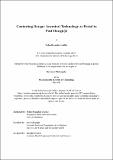Contesting Design: Ancestral Technology as Portal to Post-Design(s)
Author(s)
Reynolds-Cuéllar, Pedro
DownloadThesis PDF (120.5Mb)
Advisor
Akšamija, Azra
Terms of use
Metadata
Show full item recordAbstract
Nowadays, designers and technologists are constantly exposed to increasingly technocentric views of the future, primarily fueled by dominant ideologies—scalability, universal applicability, and profit, among others. Many of these future makers are preparing in the present, often at institutions reproducing these ideologies. However, this established understanding of what technology is and what is worthy of design is currently being challenged. Literature and practice connecting with ways of knowing and doing outside this dominant lens are rising in both technology and design studies. Alternative design programs at higher education institutions, preparing students for a world where technology is de-centered, and grassroots initiatives building futures through Indigenous technology are some of the ways in which these techno-narratives can be contested. This dissertation joins these efforts by foregrounding —and moving into practice— alternative ways to teach design and think about technology.
I start by exploring the value distribution from participatory design initiatives across participants and introduce a model for longitudinal assessment of these programs. Using the findings and insights from this study, I propose and implement two largely immersive university courses on technology design in close collaboration with rural collectives in Colombia. In contributing to methodological shifts within participatory design, I foreground connections at its intersection of Indigenous research methods. In giving a language to these proposals, I advance the notion of ‘Ancestral Technology’ as an alternate framework to approach technology design. It is a form of world-making (design) that primarily supports cultural cohesion, is rooted in bounded geography, and has a history living through collective memory. As designers and technologists interested in helping build a future outside the techno-centric imaginary, we must connect to the ancestral.
Date issued
2024-05Department
Program in Media Arts and Sciences (Massachusetts Institute of Technology)Publisher
Massachusetts Institute of Technology